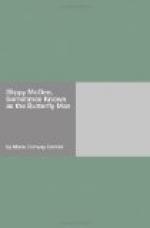“Some of us are the life-everlasting kind, the kind that used to make old man Solomon wall his eyes and throw fits and then get busy and hatch out proverbs with stings in their tails. A lot of us are half-the-day fools; and all the rest are fools for a little while. There’s nobody born that hasn’t got his times and seasons for being a fool for a while. But that’s the sort of simple the testimony slams some sense into. Like me,” he added earnestly, and closed the great Book.
I told him presently what I had heard; that, as he surmised, Mrs. Eustis was not responsible for Mary Virginia’s change of mind—or perhaps of heart. He nodded. But he offered no comment. Now, since I had come in, he had been from time to time casting at me rather speculative and doubtful glances. He drummed on the table, smiled sheepishly, and presently reached for a package, unwrapped it, and laid before me a book.
‘"The Relation of Insect Life to Human Society,’” I read, “By John Flint and Rev. Armand Jean De Rance. With notes and drawings by Father De Rance.” It bore the imprint of a great publishing house.
“You suggested it more than once,” said John Flint. “Off and on, these two years, I’ve been working on it. All the notes I particularly asked you for were for this. Mighty fine and acute notes they are, too—you’d never have been willing to do it if you’d known they were for publication—I know you. And I saved the drawings. I’m vain of those illustrations. Abbot’s weren’t in it, next to yours.”
As a matter of fact I have a pretty talent for copying plant and insect. I have but little originality, but this very limitation made the drawings more valuable. They were almost painfully exact, the measurements and coloration being as approximately perfect as I could get them.
Now that the book has been included in all standard lists I needn’t speak of it at length—the reviewers have given it what measure of bricks and bouquets it deserved. But it is a clever, able, comprehensive book, and that is why it has made its wide appeal.
Every least credit that could possibly be given to me, he had scrupulously rendered. He had made full use of note and drawing. He made light enough of his own great labor of compilation, but his preface was quick to state his “great indebtedness to his patient and wise teacher.”
One sees that the situation was not without irony. But I could not cloud his pleasure in my co-authorship nor dim his happiness by disclaiming one jot or tittle of what he had chosen to accredit me with. It is more blessed to give than to receive, but much more difficult to receive than to give.
“Do you like it?” he asked, hopefully.
“I am most horribly proud of it,” said I, honestly.
“Sure, parson? Hand on your heart?”
“Sure. Hand on my heart.”
“All right, then,” said he, sighing with relief.




